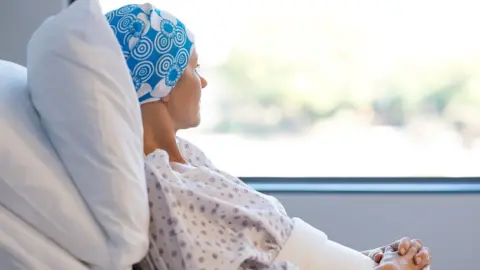Covid in Scotland: Thousands fewer had cancer treatment
 Getty Images
Getty ImagesThe number of people being diagnosed and starting cancer treatment during the first year of the Covid pandemic dropped by thousands, figures show.
The latest statistics show there were 21,536 patients beginning treatment during the year from 1 April 2020, just a week after the first Covid lockdown.
That is 4,400 fewer than the previous year and 3,500 fewer than 2018/19.
The number referred for treatment dropped most sharply in the first six months of the pandemic.
The latest stats, for the first three months of 2021, show there were 5,816 eligible referrals within the target which states patients should wait no more than 31 days from decision to treat to first cancer treatment.
That figure was up 2.1% on the previous quarter but it was still 10% less than the same period last year.
All health boards except Highland met the target of treating 95% of patients within the 31-day standard.
Another target, the 62-day standard for waits from urgent suspicion of cancer referral to first cancer treatment was only met by two health boards - NHS Borders and NHS Shetland.
Just 83% of patients started treatment within the 62-day standard.

The fall in patients being sent for treatment suggests there are thousands of people in Scotland who have cancer but for a range of reasons have not had it diagnosed.
The suspension of screening services in the early months of the pandemic will mean some cases were missed, and additional infection control measures in hospitals have put limits on the number of scans or other tests that can take place.
Some people may have avoided going to their GP with symptoms, and clinicians have already warned that they are seeing more people with advanced disease which means their outcomes are poorer.
However you look at it, what we are seeing here is just the start of the impact of Covid on cancer.
Trying to address the backlog is not an easy task.
Even before the pandemic there were staff shortages in key areas, like radiography and radiology and demand will only increase.
But efforts are being made to find new ways of working.
Money is being made available to health boards to do things like extending clinics, or to speed up the process of getting test results.
And new early diagnostic centres will play a role in detecting some cancers that do not have specific symptoms and so can be harder for GPs to spot.

'Bottleneck at diagnosis'
Janice Preston, from cancer charity Macmillan in Scotland, said the latest figures were "deeply concerning".
"Behind every breached waiting time is a person trying to cope with the stress and anxiety of not knowing if they have a life threatening illness," she said.
"It's clear there is a major cancer workforce issue across Scotland which must be tackled urgently, particularly around the bottleneck at diagnosis.
"These figures also show there has been a continued drop in the number of people going through the cancer system.
"This is very unlikely to be the result of a genuine reduction in the number of people with cancer. Instead it raises the very worrying prospect that thousands of people in Scotland are living with cancers they are completely unaware of."
 Getty Images
Getty ImagesScottish Conservative health spokeswoman Annie Wells said the figures highlighted the "devastating effects" the pandemic has had for thousands of cancer patients across Scotland.
"Being treated as quickly as possible gives patients the best chance of survival, but SNP Ministers are failing to hit key targets and the picture is only getting worse," she said.
"We now shamefully see that the number of patients getting their first cancer treatment within two months is now at the lowest level in a year. SNP ministers must go further and faster to urgently tackle the backlog in waiting times for patients."
Scottish Labour said the 62-day cancer treatment target had not been met since 2012.
It said the target was missed in the last quarter despite referrals being 6% below pre-pandemic level.
Scottish Labour's health spokeswoman Jackie Baillie said: "Scotland is living through a national emergency in cancer care - and it is costing lives.
"These shameful figures are made even more shocking when you realise that the pandemic has seen referrals drop - meaning many Scots could be living with cancer and not even know it."
Clinical priority
Health Secretary Humza Yousaf said: "It is reassuring that, during a further national Covid-19 lockdown in the first quarter of 2021, once a decision to treat was made cancer patients in Scotland waited on average five days for treatment.
"The 31-day standard has been consistently met throughout the pandemic.
"While the overall aim is to improve cancer waiting times performance, our priority - as the NHS continues to remobilise - remains ensuring that vital services are delivered safely to patients based on their clinical priority."
According to the Public Health Scotland report some health boards have highlighted that staffing and capacity issues have impacted on performance in the latest quarter, with issues arising around self-isolation, social distancing and cleaning time between patients.
The increase in eligible referrals is largely due to the gradual reopening of three screening programmes - breast and cervical, which resumed slowly over last summer and bowel screening which resumed on 12 October.